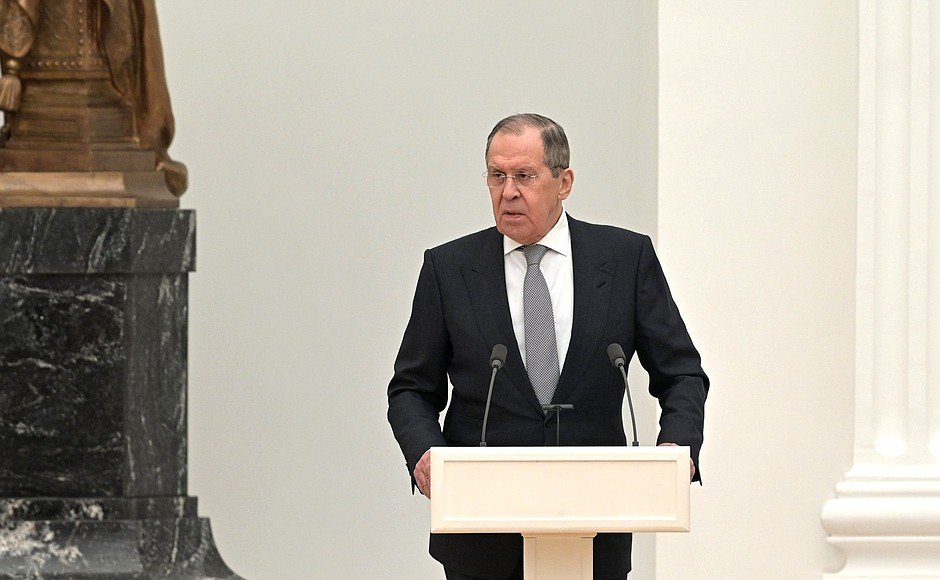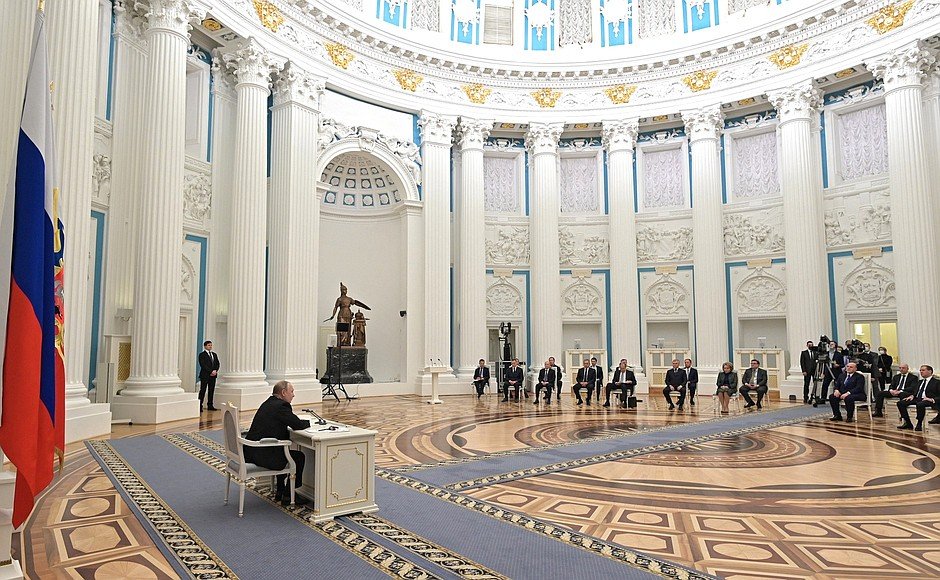Moscow, 22 February 2022 (TDI): Russian President, Vladimir Putin, met the members of the Russian Security Council along with Russian Foreign Minister, Sergey Lavrov. The purpose of the meeting was to discuss the developments of Ukraine. The meeting took place on February 21.
Remarks of Russian President
At the meeting, the Russian President pointed out the background of the Ukraine crisis along with the developments of Lugansk and Donetsk. He also explained the outcomes and consequences of the 2014 coup of Crimea.
Russian Foreign Minister, Sergey Lavrov, was also present at the meeting of the Russian Security Council where he explained the ongoing security situation of Europe at large.
Background of Ukraine Crisis
At the meeting, Russian President, Vladimir Putin, highlighted the background of the Ukraine crisis. In 2014, the Ukrainian people didn’t accept the outcomes of this anti-constitutional and blood-shedding coup. Unfortunately, this armed coup killed many people.
Thereupon, these people demanded the independence of the Lugansk People’s Republic and the Donetsk People’s Republic. Subsequently, this was the point of confrontation between Kyiv officials and the people of that region.
Accordingly, President Vladimir Putin noted that Russian Federation tried to resolve these disagreements peacefully. Moreover, authorities of Kyiv conductive two operations to suppress the resentment.
President Putin further noted that this is the third escalation in the region. As a result, the people of the region have faced torture due to constant blockades and shelling. Among them, many are forced to live under the basements.
Minsk Protocol and role of NATO
In this context, Russian President, Vladimir Putin, highlighted the significance of the Minsk agreement. But, he remarked that Kyiv authorities are not serious about implementing the Minsk agreement.
Further, the Russian President remarked that today’s meeting will discuss and dissect the sovereign status of Lugansk People’s Republic and Donetsk People’s Republic.
However, this situation is directly linked with international security, particularly the European continent. Unfortunately, the usage of Ukraine as a tool is a major threat for Russian Federation as well. For these reasons, President Putin stated that we have intensified our dialogue process with NATO and Washington.
Indeed, Russian Federation’s ultimate priority is to maintain peace and security. Accordingly, Article 5 of the NATO charter states that allied states must fight on the side of co-member states facing aggression.
But, there is no recognition for the people of Crimea and Sevastopol in this regard. As a result, Ukraine has claimed these territories and may try to get back territories with the help of military force.
The case of Ukraine joining the NATO
It is pertinent to note that some NATO countries don’t want Ukraine to join NATO. Later, in April 2008, they signed Bucharest Memorandum which allowed Georgia and Ukraine to join NATO.
In brief, the Russian President stated that if these states can take one step under US pressure, who will guarantee the other steps. Of course, there exists no guarantee. Considering the current state of the affairs, the Russian President reiterated that the US has not provided any security guarantees.
Remarks of Russian Foreign Minister
At Security Council, Russian Foreign Minister, Sergey Lavrov, said that Western colleagues are not ready to provide concrete proposals, particularly on eastward non-expansionism.
In this regard, NATO has rejected Russian demands owing to its ‘open-door policy. Regrettably, there is no alternative for concerned parties either.

Nevertheless, the Russian Foreign Minister remarked that the US is avoiding the principle of indivisibility which is the fundamental concern of the Russian Federation.
He then pointed out that the US has derived apart from the principle which allows states to choose alliance. But, the other part is ignored which states that no state can strengthen its security at the expense of other states.
Letters to NATO and EU members
Eventually, Sergey Lavrov mentioned that he has sent letters to NATO and EU members, including Switzerland as well. In those letters, he provided a detailed analysis of the legal standing of OSCE and Russia-NATO relations.
He also highlighted the significance of the 1997 Founding Act and the Rome Declaration which was approved in 2002. Furthermore, the Russian Foreign Minister emphasized the second priority of Russian Federations which concerns the establishment of relations in 1997.
In the context of 1997 documents, Russia and NATO were not adversaries for the development of the strategic relationship. Therefore, he suggested returning to the 1997 status of NATO forces on the eastern side.
But, Western Colleagues have disregarded this argument. In return, NATO has suggested stopping the ‘occupation of Crimea’ and ‘withdrawal of forces from Ukraine, Georgia, and Moldova.
Implementation status of Minsk Protocol
Generally, Sergey Lavrov emphasized that concerned documents stress the significance of the Minsk Protocol. But, it does not compel Kyiv to implement the package as well. Many public statements of Kyiv officials disregard the package of measures.
The course of Arms withdrawal
In addition to that, Sergey Lavrov explained the Russian demand for the withdrawal of arms systems. In response, the US has started the discussion of land-based medium and short-range missiles.
Besides, the US has sent proposals to increase military predictability and transparency. In this regard, the Russian Foreign Minister explained that all these proposals are close to the Russian demands which were later presented to the West earlier via various proposals.
Regulation of flight of Strategic Bombers
Along these lines, the Russian Foreign Minister uttered that the US has suggested regulation of flight of strategic bombers to avoid incidents at sea and in the airspace of the sea.
He said that the US is more focused on resumption of contact between forces, surprise inspections, the establishment of the civilian hotline, and the creation of structures to avoid military incidents.
The context of the Munich Security Conference
Overall, the Russian Foreign Minister maintained that the US wants to maintain dialogue on the pretext that it does not affect its vital interests. He then commented on the recent Munich Security Conference.
He said that Western Representatives referred to a unified approach at the Munich Conference for the resolution of the Ukraine crisis. The conference also confirmed that Russia must negotiate with Washington.
Russia is ready to Negotiate
Similarly, he stated that Russia is ready to negotiate with the US on the pretext the US listens to the core interest of the Russian Federation. By and large, the Russian call is considered as a demand.
Thereafter, he stated that Western Colleagues doesn’t bother to explain why not to follow previous agreements and why to strengthen security at the expense of other countries. Certainly, this is the major hurdle in the negotiation dialogue.
Next meeting of Russian Foreign Minister with US State Secretary
In this matter, the Russian Foreign Minister also mentioned that he has sent proposals to the US. He then added that US Secretary State, Antony Blinken, has read our document and is ready to negotiate further.
Therefore, the Russian Foreign Minister stated that his meeting with Secretary Blinken will take place in Geneva on 24 February. In the same vein, he told that he will also have a telephone conversation with French Minister to clarify what the Americans want to discuss.
MPhil Scholar at Centre of South Asian Studies, University of the Punjab, Lahore








